Unit12 Life is full of the unexpected section A1a-2d课件(共26张PPT)+内嵌音频
文档属性
| 名称 | Unit12 Life is full of the unexpected section A1a-2d课件(共26张PPT)+内嵌音频 |  | |
| 格式 | zip | ||
| 文件大小 | 6.8MB | ||
| 资源类型 | 试卷 | ||
| 版本资源 | 人教新目标(Go for it)版 | ||
| 科目 | 英语 | ||
| 更新时间 | 2022-12-28 20:36:37 | ||
图片预览

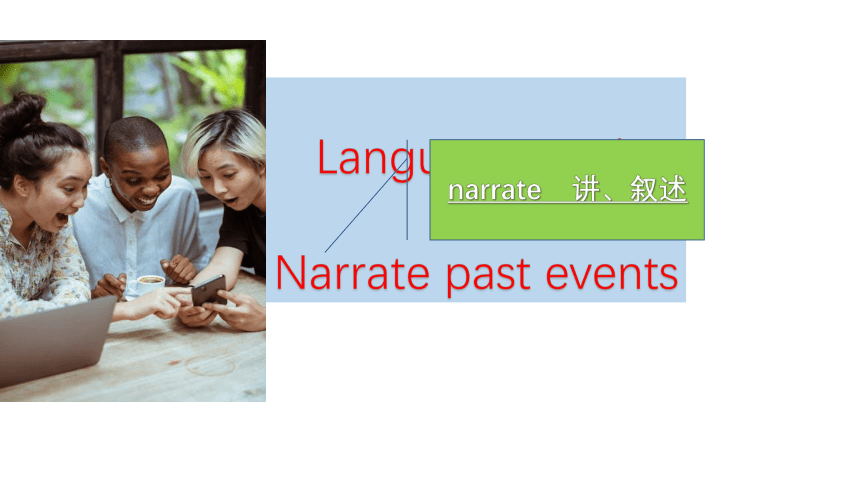
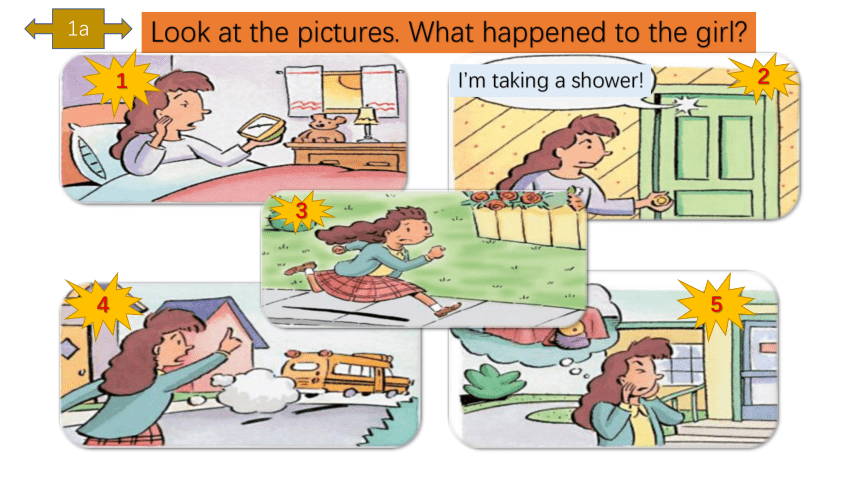
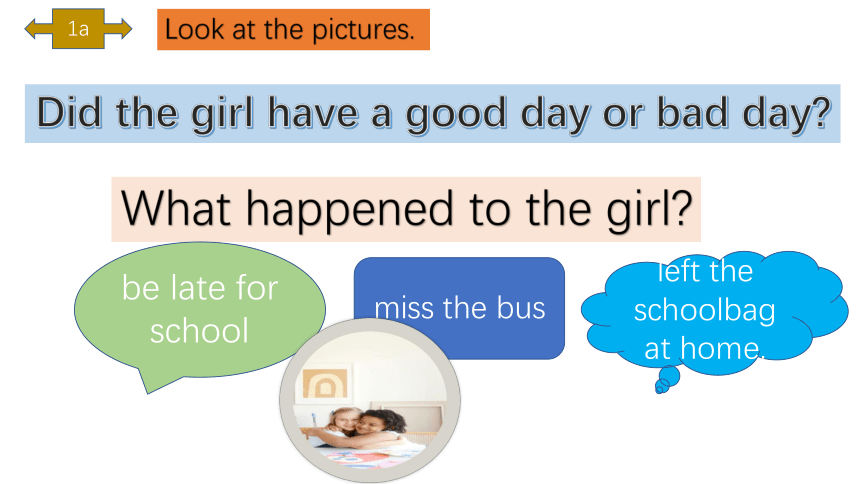
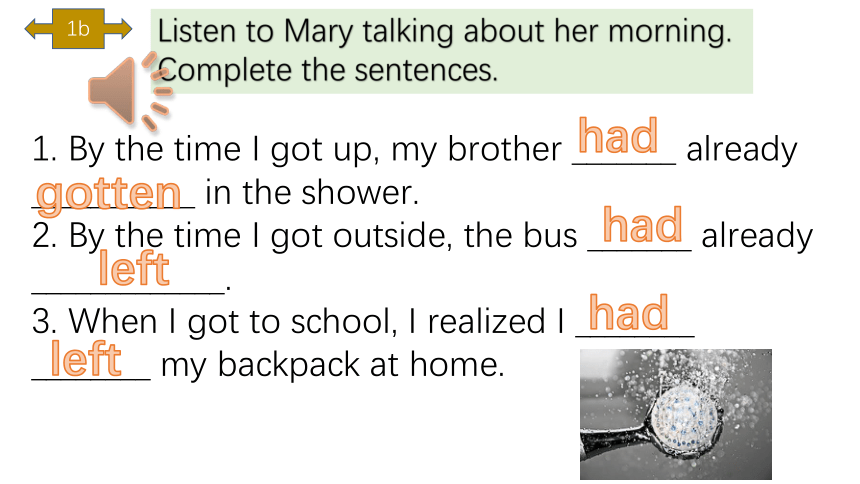
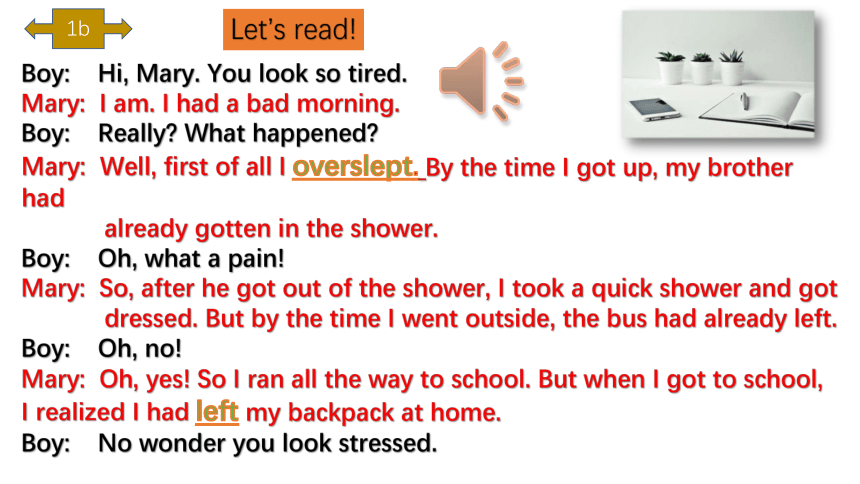

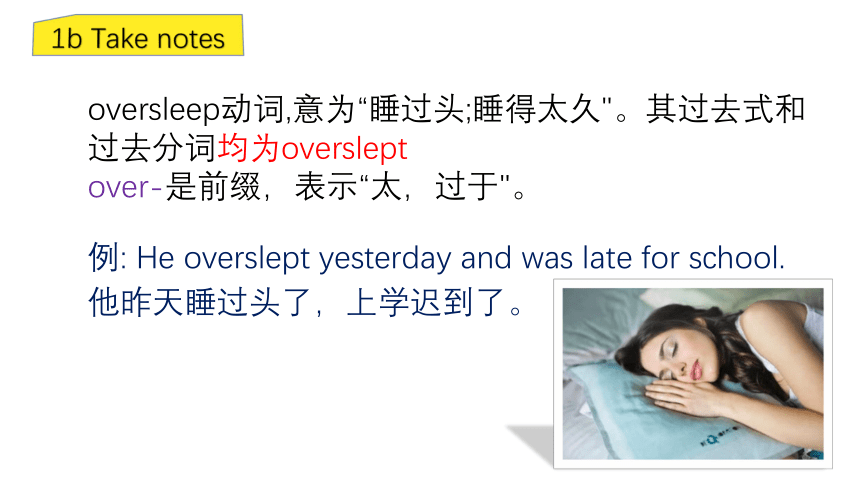
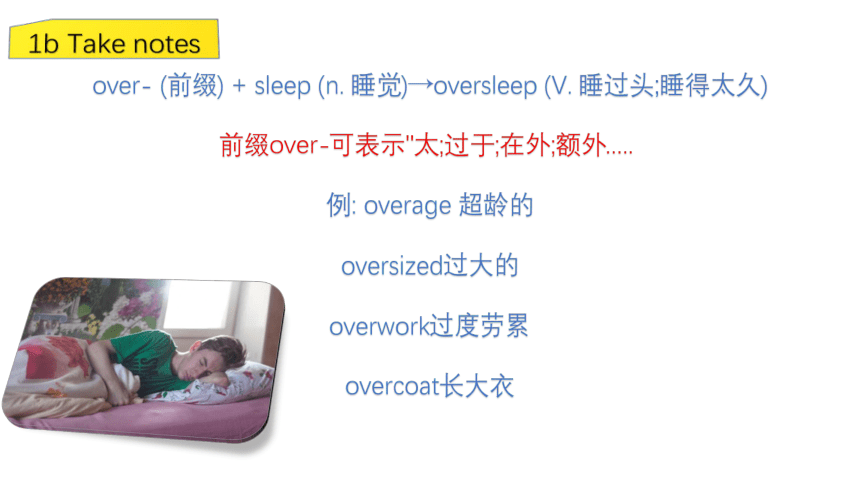
文档简介
(共26张PPT)
Unit 12
Life is full of unexpected
Section A 1a-2d
Language goal:
Narrate past events
narrate 讲、叙述
1a
Look at the pictures. What happened to the girl
3
2
1
4
5
I’m taking a shower!
1a
Look at the pictures.
Did the girl have a good day or bad day
What happened to the girl
be late for school
miss the bus
left the schoolbag at home.
1b
Listen to Mary talking about her morning.
Complete the sentences.
1. By the time I got up, my brother _______ already ___________ in the shower.
2. By the time I got outside, the bus _______ already _____________.
3. When I got to school, I realized I ________ ________ my backpack at home.
had
gotten
left
had
left
had
Boy: Hi, Mary. You look so tired.
Mary: I am. I had a bad morning.
Boy: Really What happened
Mary: Well, first of all I overslept. By the time I got up, my brother had
already gotten in the shower.
Boy: Oh, what a pain!
Mary: So, after he got out of the shower, I took a quick shower and got
dressed. But by the time I went outside, the bus had already left.
Boy: Oh, no!
Mary: Oh, yes! So I ran all the way to school. But when I got to school, I realized I had left my backpack at home.
Boy: No wonder you look stressed.
Let’s read!
1b
过去完成时,表示在过去某一时间或动作之前
已经发生或完成了的动作
,其构成为”助动词had+动词的过去分词”,
had无人称和数的变化。
例: When got there, he had finished his work.
当我到达那儿时,他已经完成了工作。
1b Take notes
oversleep动词,意为“睡过头;睡得太久"。其过去式和过去分词均为overslept
over-是前缀,表示“太,过于"。
例: He overslept yesterday and was late for school.
他昨天睡过头了,上学迟到了。
1b Take notes
over- (前缀) + sleep (n. 睡觉)→oversleep (V. 睡过头;睡得太久)
前缀over-可表示"太;过于;在外;额外.....
例: overage 超龄的
oversized过大的
overwork过度劳累
overcoat长大衣
leave (left, left) 在此为及物动词,意为“遗忘;留下"。
常用结构: leave+宾语+地点状语,
意为“把某物忘在某处(地)"。
例: I often leave my keys in the car.
我经常把钥匙忘在车里。
Jim often leaves his glasses at school.
吉姆经常把眼镜忘在学校。
leave作"遗忘;留下”讲时,
通常要与地点状语连用,表示将某物遗忘在某个地方,
"leave sth. +地点状语“
forget也有“遗忘,忘记”之意,指忘记一件具体的东西,
但不具体说明某物忘在什么地方,
即"forget sth.’
例: Don't leave your book at home.不要把你的书落在家里。
| forgot my keys.我忘了带钥匙。
Take turns being Mary. Look at the pictures above
and talk about what happened this morning.
1c
2a
Pre-listening.
1、Where is Mary in the pictures
2、Is anything good or bad happening to her
3、what do you think it is about
She is at school/in the classroom.
Something bad is happening to her.
I think it is about her schoolbag/books/keys.
2a
Listen to Mary continue her story.
Number the pictures [1–4] in the correct order.
3
1
2
4
2b
Fill in the blanks with the correct forms of the verbs in brackets.
Then listen again and check your answers.
When I ___________ (get) home, I realized
I _____________ (leave) my keys in the backpack.
2. By the time I ______ (get) back to school, the
bell ___________ (ring).
3. By the time I _________ (walk) into class, the teacher _____________ (start) teaching already.
had started
had left
got
walked
had rung
got
2b
Boy: So then what did you do, Mary
Mary: Well, I ran home to get my backpack. But when I got home, I
realized I had left my keys in the backpack.
Boy: You’re kidding!
Mary: So I ran back to school without my keys or my backpack. But by the time I got back to school, the bell had rung.
Boy: Oh, no!
Mary: And by the time I walked into class, the teacher had started teaching already. She asked for our homework, but of course I didn’t have it.
Read together!
1、ring用作及物动词,意为“敲(钟), 按(铃)"。
例: The boy prefers ringing the doorbell to knocking at the door.
比起敲门,这男孩儿更喜欢按门铃。
2、ring用作可数名词,意为”戒指;环;圈;铃声;钟声"。
例: She wore diamond ring. 她戴着一枚钻戒。
There was ring at the door.门铃响了。
2b take notes
2c
Make up an ending for the story and share it with your partner.
The teacher looked at Mary and ...
Role-play the conversation
2d
Matt: Why were you late for class today, Kevin
Kevin: My alarm clock didn't go off! I kept sleeping, and when
I woke up it was already 8:00 a.m.!
Matt: Oh, no!
Kevin: So I just quickly put on some clothes and rushed out of the door.
Matt: You didn't eat breakfast
Kevin: No, I didn't even brush my teeth or wash my face! But before I got to
the bus stop, the bus had already left.
Matt: Then how did you get here
Kevin: Luckily, Carl's dad saw me on the street and gave me a lift in his car.
Mat: Well, at least by the time you got to school,
you were only five minutes late for class.
be late for意为“迟到",其中late为形容词,意为“迟的;晚的”。
例: Don't be late for the meeting next time.
下次开会别迟到了。
late还可用作副词,意为"迟;晚"。
例: | got up late this morning.今天早上我起床晚了。
2d take notes
lately用作副词,意为”最近;近来"。
later用作副词时,意为“后来;以后";
用作形容词时,意为“后来的;以后的”。
Don 't' be late class. We must be on time.
A. for B.to C.in
解析: be late for为固定短语,意为"迟到", 故选A。
2d take notes
go off意为"(闹钟等)响”,
也可以表示"(食物)变坏、变质; (灯) 熄灭;
(水、电)断掉; (质量)下降”。
例: My alarm clock goes off at six every morning.
我的闹钟每天早晨6点响。.
Milk goes off quickly in hot weather.
牛奶在热天很快就变质。
The goods sold at this shop have gone off.
这个商店出售的货物的质量下降了。
2d take notes
go back返回
go by经过
go out出去
go around四处走动
go home回家
go away走开,离开
go shopping去购物
go on继续
2d take notes
2d take notes
put on强调“穿(戴)"的动作,宾语是物,反义词组为take off
dress既可表动作也可表状态,既可作及物动词也可作不及物动词,
其宾语是人
wear强调“穿(戴)"的状态,以物为宾语,可用于进行时态
have on强调"穿(戴)"的状态,以物为宾语,不能用于进行时态
rush out of意为冲出..... 奔...
.例: She caught up her hat and rushed out of the door.
她抓起帽子就冲出门去了。
rush用作动词,意为“冲;奔"。常用短语rush to do sth.
意为“赶紧做某事;抢着做某事”。
例: He's always rushing to finish first.
他总是赶着第一个完成。
②rush还可用作名词,意为”匆忙;忙碌;争购"。
常用短语: rush hour (上下班时的)交通高峰期;
in rush匆忙地。
2d take notes
luckily副词,意为“幸运地”,常位于句首,也可位于句中或句尾。
其名词是luck(运气),形容词是lucky (幸运的),
反义词是unluckily (不幸地)。
例: The fire last night destroyed many buildings. Luckily, no one was killed.
昨晚的大火毁坏了许多建筑物。
幸运的是,没有一个人死亡。
2d take notes
Unit 12
Life is full of unexpected
Section A 1a-2d
Language goal:
Narrate past events
narrate 讲、叙述
1a
Look at the pictures. What happened to the girl
3
2
1
4
5
I’m taking a shower!
1a
Look at the pictures.
Did the girl have a good day or bad day
What happened to the girl
be late for school
miss the bus
left the schoolbag at home.
1b
Listen to Mary talking about her morning.
Complete the sentences.
1. By the time I got up, my brother _______ already ___________ in the shower.
2. By the time I got outside, the bus _______ already _____________.
3. When I got to school, I realized I ________ ________ my backpack at home.
had
gotten
left
had
left
had
Boy: Hi, Mary. You look so tired.
Mary: I am. I had a bad morning.
Boy: Really What happened
Mary: Well, first of all I overslept. By the time I got up, my brother had
already gotten in the shower.
Boy: Oh, what a pain!
Mary: So, after he got out of the shower, I took a quick shower and got
dressed. But by the time I went outside, the bus had already left.
Boy: Oh, no!
Mary: Oh, yes! So I ran all the way to school. But when I got to school, I realized I had left my backpack at home.
Boy: No wonder you look stressed.
Let’s read!
1b
过去完成时,表示在过去某一时间或动作之前
已经发生或完成了的动作
,其构成为”助动词had+动词的过去分词”,
had无人称和数的变化。
例: When got there, he had finished his work.
当我到达那儿时,他已经完成了工作。
1b Take notes
oversleep动词,意为“睡过头;睡得太久"。其过去式和过去分词均为overslept
over-是前缀,表示“太,过于"。
例: He overslept yesterday and was late for school.
他昨天睡过头了,上学迟到了。
1b Take notes
over- (前缀) + sleep (n. 睡觉)→oversleep (V. 睡过头;睡得太久)
前缀over-可表示"太;过于;在外;额外.....
例: overage 超龄的
oversized过大的
overwork过度劳累
overcoat长大衣
leave (left, left) 在此为及物动词,意为“遗忘;留下"。
常用结构: leave+宾语+地点状语,
意为“把某物忘在某处(地)"。
例: I often leave my keys in the car.
我经常把钥匙忘在车里。
Jim often leaves his glasses at school.
吉姆经常把眼镜忘在学校。
leave作"遗忘;留下”讲时,
通常要与地点状语连用,表示将某物遗忘在某个地方,
"leave sth. +地点状语“
forget也有“遗忘,忘记”之意,指忘记一件具体的东西,
但不具体说明某物忘在什么地方,
即"forget sth.’
例: Don't leave your book at home.不要把你的书落在家里。
| forgot my keys.我忘了带钥匙。
Take turns being Mary. Look at the pictures above
and talk about what happened this morning.
1c
2a
Pre-listening.
1、Where is Mary in the pictures
2、Is anything good or bad happening to her
3、what do you think it is about
She is at school/in the classroom.
Something bad is happening to her.
I think it is about her schoolbag/books/keys.
2a
Listen to Mary continue her story.
Number the pictures [1–4] in the correct order.
3
1
2
4
2b
Fill in the blanks with the correct forms of the verbs in brackets.
Then listen again and check your answers.
When I ___________ (get) home, I realized
I _____________ (leave) my keys in the backpack.
2. By the time I ______ (get) back to school, the
bell ___________ (ring).
3. By the time I _________ (walk) into class, the teacher _____________ (start) teaching already.
had started
had left
got
walked
had rung
got
2b
Boy: So then what did you do, Mary
Mary: Well, I ran home to get my backpack. But when I got home, I
realized I had left my keys in the backpack.
Boy: You’re kidding!
Mary: So I ran back to school without my keys or my backpack. But by the time I got back to school, the bell had rung.
Boy: Oh, no!
Mary: And by the time I walked into class, the teacher had started teaching already. She asked for our homework, but of course I didn’t have it.
Read together!
1、ring用作及物动词,意为“敲(钟), 按(铃)"。
例: The boy prefers ringing the doorbell to knocking at the door.
比起敲门,这男孩儿更喜欢按门铃。
2、ring用作可数名词,意为”戒指;环;圈;铃声;钟声"。
例: She wore diamond ring. 她戴着一枚钻戒。
There was ring at the door.门铃响了。
2b take notes
2c
Make up an ending for the story and share it with your partner.
The teacher looked at Mary and ...
Role-play the conversation
2d
Matt: Why were you late for class today, Kevin
Kevin: My alarm clock didn't go off! I kept sleeping, and when
I woke up it was already 8:00 a.m.!
Matt: Oh, no!
Kevin: So I just quickly put on some clothes and rushed out of the door.
Matt: You didn't eat breakfast
Kevin: No, I didn't even brush my teeth or wash my face! But before I got to
the bus stop, the bus had already left.
Matt: Then how did you get here
Kevin: Luckily, Carl's dad saw me on the street and gave me a lift in his car.
Mat: Well, at least by the time you got to school,
you were only five minutes late for class.
be late for意为“迟到",其中late为形容词,意为“迟的;晚的”。
例: Don't be late for the meeting next time.
下次开会别迟到了。
late还可用作副词,意为"迟;晚"。
例: | got up late this morning.今天早上我起床晚了。
2d take notes
lately用作副词,意为”最近;近来"。
later用作副词时,意为“后来;以后";
用作形容词时,意为“后来的;以后的”。
Don 't' be late class. We must be on time.
A. for B.to C.in
解析: be late for为固定短语,意为"迟到", 故选A。
2d take notes
go off意为"(闹钟等)响”,
也可以表示"(食物)变坏、变质; (灯) 熄灭;
(水、电)断掉; (质量)下降”。
例: My alarm clock goes off at six every morning.
我的闹钟每天早晨6点响。.
Milk goes off quickly in hot weather.
牛奶在热天很快就变质。
The goods sold at this shop have gone off.
这个商店出售的货物的质量下降了。
2d take notes
go back返回
go by经过
go out出去
go around四处走动
go home回家
go away走开,离开
go shopping去购物
go on继续
2d take notes
2d take notes
put on强调“穿(戴)"的动作,宾语是物,反义词组为take off
dress既可表动作也可表状态,既可作及物动词也可作不及物动词,
其宾语是人
wear强调“穿(戴)"的状态,以物为宾语,可用于进行时态
have on强调"穿(戴)"的状态,以物为宾语,不能用于进行时态
rush out of意为冲出..... 奔...
.例: She caught up her hat and rushed out of the door.
她抓起帽子就冲出门去了。
rush用作动词,意为“冲;奔"。常用短语rush to do sth.
意为“赶紧做某事;抢着做某事”。
例: He's always rushing to finish first.
他总是赶着第一个完成。
②rush还可用作名词,意为”匆忙;忙碌;争购"。
常用短语: rush hour (上下班时的)交通高峰期;
in rush匆忙地。
2d take notes
luckily副词,意为“幸运地”,常位于句首,也可位于句中或句尾。
其名词是luck(运气),形容词是lucky (幸运的),
反义词是unluckily (不幸地)。
例: The fire last night destroyed many buildings. Luckily, no one was killed.
昨晚的大火毁坏了许多建筑物。
幸运的是,没有一个人死亡。
2d take notes
同课章节目录
- Unit 1 How can we become good learners.
- Section A
- Section B
- Unit 2 I think that mooncakes are delicious!
- Section A
- Section B
- Unit 3 Could you please tell me where the restroom
- Section A
- Section B
- Unit 4 I used to be afraid of the dark.
- Section A
- Section B
- Unit 5 What are the shirts made of?
- Section A
- Section B
- Review of Units 1-5
- Unit 6 When was it invented?
- Section A
- Section B
- Unit 7 Teenagers should be allowed to choose their
- Section A
- Section B
- Unit 8 It must belong to Carla.
- Section A
- Section B
- Unit 9 I like music that I can dance to.
- Section A
- Section B
- Unit 10 You're supposed to shake hands.
- Section A
- Section B
- Review of Units 6-10
- Unit 11 Sad movies make me cry.
- Section A
- Section B
- Unit 12 Life is full of the unexpected
- Section A
- Section B
- Unit 13 We're trying to save the earth!
- Section A
- Section B
- Unit 14 I remember meeting all of you in Grade 7.
- Section A
- Section B
- Review of Units 11-14
